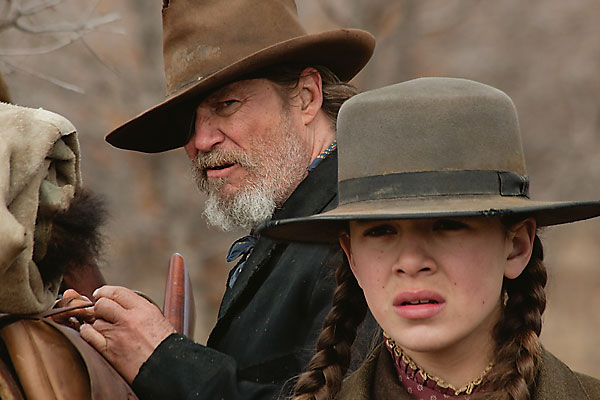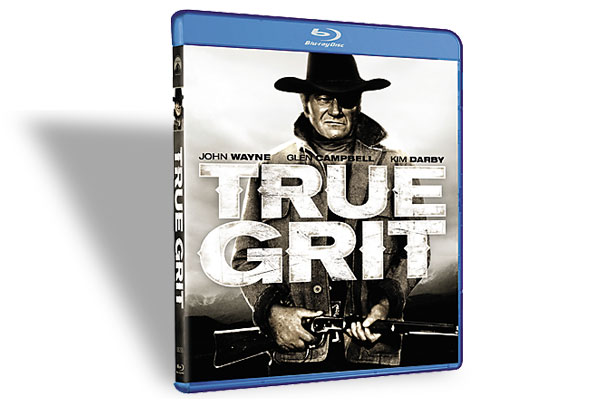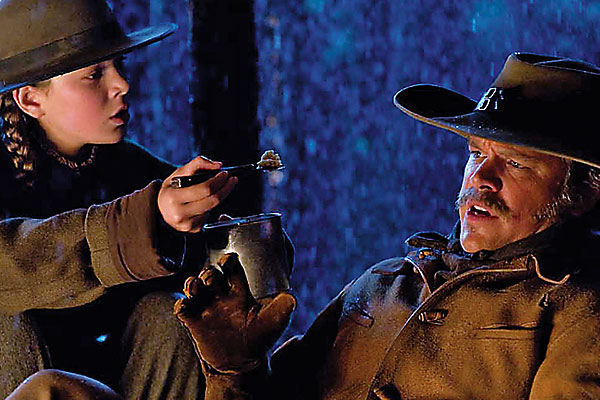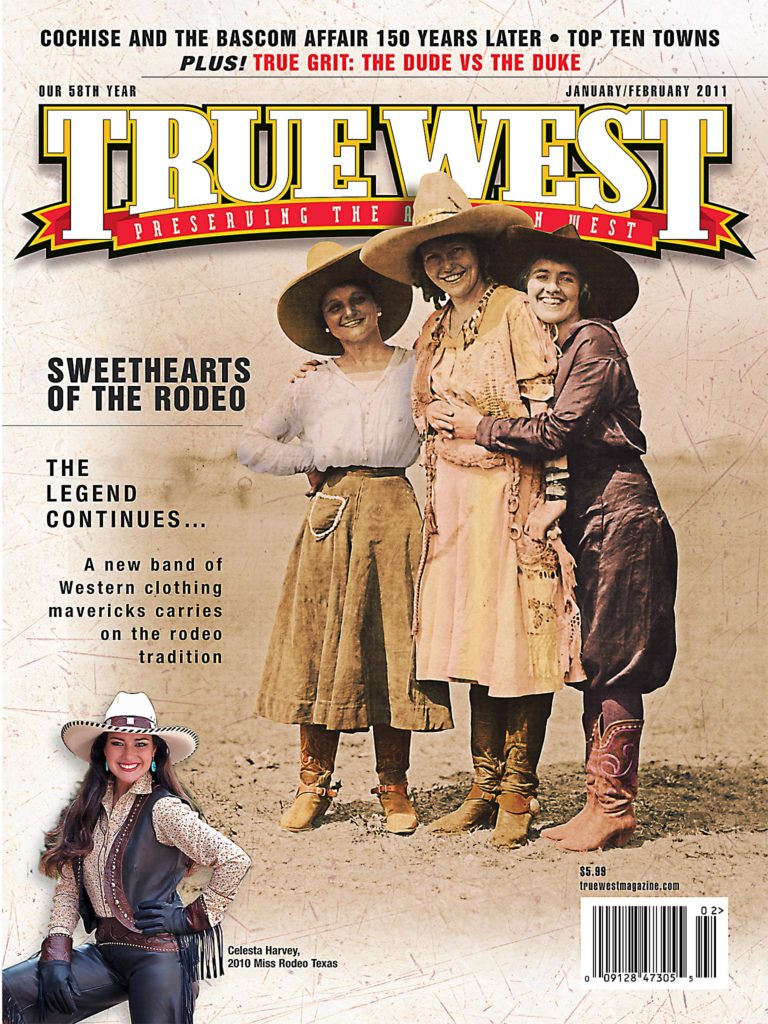
The Western changed in 1969, and that evolutionary shift can be credited to three movies, each unique, each as good as the other two and each one a little subversive, using the past as a way to move into the future.
The Wild Bunch and True Grit were both released in June, and Butch Cassidy and the Sundance Kid showed up that fall.
When the awards season came about, Butch and Sundance waltzed away with an armload of Oscars, while The Wild Bunch managed a paltry two nominations and no wins. True Grit, on the other hand, overshadowed them all by handing John Wayne his only Academy Award, for his portrayal of Deputy U.S. Marshal Reuben “Rooster” Cogburn, a grizzled, one-eyed, ex-Missouri bushwacker who rounded up fugitives for the court of Judge Isaac Parker out of Fort Smith, Arkansas.
While many believe the award was a lifetime achievement gesture on the part of the Academy, the truth is, Wayne turned in a performance as good as anything he’d done, with the exception of 1956’s The Searchers. What makes Wayne’s performance so good is something that has escaped most critics—Wayne delivers a much more nuanced character, taking a back seat to both Kim Darby’s Mattie Ross and to the story. It takes a bit of squinting because he occupies so much of the frame, but Wayne actually underplays Cogburn. Comparing him to Wallace Beery or any other scene-chewing Long John Silver is wide of the mark.
When Joel and Ethan Coen announced their intention to remake True Grit, two immediate reactions were voiced. Some felt that the Coens would make a version that is more faithful to Charles Portis’s 1968 novel, which is near and dear to many readers (this reaction makes sense, since the original material is closer in tone to what the Coens do best). Others could not imagine how Jeff Bridges, the Dude, could hope to fill John Wayne’s, the Duke’s, shoes (even though Wayne had small feet, but you know what I mean).
The rumor is that Bridges will be subtle where Wayne was broad, but I’m willing to bet it will be the exact opposite, or, at the very least, that Bridges will do what Wayne did and skew pretty close to the same idea of Cogburn.
As to the book, the original film is about as accurate an adaptation of the novel as it could possibly be. Formerly blacklisted Marguerite Roberts moved so much of the book into the picture, an amazing feat considering that the story is a first-person narrative and that Mattie’s observations and asides are what give the book its flavor and charm.
What Roberts changed, and what the new version will almost certainly set right, comes at the end of the story. (Disclaimer: Anyone not familiar with the book or the earlier movie might want to skip past this part of the article.)
In the novel, Texas Ranger La Boeuf lives, and leaves the story, whereas he dies in Henry Hathaway’s 1969 movie (in the Coen brothers’ December 2010 movie, Matt Damon will play La Boeuf). More important, Mattie and Rooster Cogburn part in the novel without saying goodbye.
Many years later, in 1903, the one-armed Mattie (she keeps her arm in the 1969 movie) gets word that Cogburn, after having played a role in the 1892 Johnson County War, is part of a touring Wild West show with a couple of his former Missouri pals, Frank James and Cole Younger. When she goes to see Cogburn, she finds that he’s been dead only a few days. She removes his body from a Confederate cemetery and brings it home to Arkansas; it’s as close to a sentimental gesture as Mattie will ever get, and all the more poignant for it.
The new version of True Grit, which is already getting a degree of Oscar buzz, will likely be a brilliantly directed and acted Western. I’m betting the screenplay will be close to the original movie’s, and maybe a tad more accurate at the end. But the best that we can hope for is that it is as good as the original, and that’s hoping for a lot.
Glen Campbell
As La Boeuf, the keen-eyed Texas Ranger with the Sharps carbine, Glen Campbell was the newest kid on the block, or, in this case, the set of the 1969 film.
Campbell had become an overnight TV sensation and platinum-selling recording artist after toiling as a session sideman over 10 years. When he worked the
LA music scene, Tommy Smothers encouraged him to take a center spot on the Smothers Brothers’ summer variety show. From there, he had his own show and a career big enough to make John Wayne come and introduce himself.
What Campbell brought to the part of the Texas Ranger was his own Arkansas hardscrabble childhood, which included an annual drive with his family to Indiana to pick apples in the fall.
True West: Henry Hathaway, who directed you in True Grit, had a reputation for bullying actors. As a first time actor, how did you deal with it?
Glen Campbell: I just told him, “Hey! I’ve got another job! Cool it, or I’ll just go do my other job.” [Laughs.]
He would get up there and say do this and do that. I’d say, “You can ask me to do something; I’ll do it for you. But if you’re going to talk like that, I won’t. I’ll just slap the s— out of you and walk off. I’m older than you are, and I can whip you!”
I did say it to him one time, and he looked at me and actually grinned. [Laughs.] I told him, “I can whip your ass. Now get off of me,” and he grinned. So I knew his bark was worse than his bite … and we actually became good friends.
The guy who was in the movie with me, what’s his name? He plays guitar and sings a little bit, the one who plays the head of the outlaws—
Robert Duvall?
Robert Duvall! He told Hathaway right off, “You ain’t too old for me to just knock the s— out of you.” He said, “Ask me nice.”
Henry was getting mad, and he’d have tantrums: “You don’t know a goddamn thing about it. In our day we did it blah blah.” [Duvall] would just tell him to shut up. [Laughs.]
Hathaway made a lot of Westerns, going back to the Zane Grey pictures of the 1930s. Did you feel like you were in good hands?
Yeah, he knew his business. And True Grit was a great Western—great theme and everything—the whole shootin’ match.
How did you get your part?
John Wayne’s little daughter was sittin’ in front of the Goodtime Hour, and she liked the Glen Campbell Goodtime Hour. She wanted to come and meet Glen Campbell.
That’s how I met John Wayne. He came into the studio while we were rehearsing the TV show, and he asked, “Is Glen Campbell around here?” And he had a little s— eatin’ grin on his face.
[While working with him in True Grit] John Wayne was just totally, totally, totally awesome. I said, “Duke, I don’t think I’ve ever stepped in front of a camera and tried to act.” He said, “Well, I’ll talk you through it.” I said, “Okay.”
Did you play chess on the set?
Yeah. We played chess. He’d beat the snots offa anybody. Hell, he’d been doin’ it for a hundred years! He could back up [his assertions] when he wanted to. He was awesome.
What do people not know about Wayne?
Probably nothing. He was right out in front; there was no B.S. What you saw was what you got with John Wayne. He didn’t take no crap off nobody. You never heard him cursing. He was that guy.
He drove me around to see all this land that he had bought in Colorado, and it was just like I was runnin’ around with my dad. He was just a wonderful, wonderful human being.
Hailee Steinfeld
As her story concludes, Mattie Ross admits, with some defiance, that the locals are right when they say she has two loves: the Presbyterian Church and her bank. But she also has a great yarn, of a time when she went out, at 14, to avenge her father’s murder, “over in the Choctaw Nation when the snow was on the ground.”
When the Coen brothers decided to film their own version of Charles Portis’s novel, casting Jeff Bridges as Rooster Cogburn was possibly the easiest choice they made. Finding Mattie Ross, on the other hand, involved open casting calls all across the Southwest.
In 1968, Kim Darby was 21 and had years of TV under her belt when she played Mattie in the 1969 version. Hailee Steinfeld, the new Mattie, was actually a year younger than the character (she turned 14 in December), had very few credits and was found in Hollywood’s backyard, Thousand Oaks, where hundreds, if not thousands, of Westerns have been filmed.
If Hailee was short of grit going into this picture, carrying a movie of this size and pedigree, and working with a cast and crew this seasoned, will certainly provide her with a measure of grit that could last her a lifetime.
True West: What do you think the Coen brothers saw in you that convinced them you were their Mattie?
Hailee Steinfeld: That’s a question for them! [Laughs.] Honestly, in the few years I’ve been acting, True Grit was the first time I felt 200-percent prepared. I was ready to go; my energy was all the way up. I went in as Mattie Ross … and as much as it clicked with them, I think it clicked with me too.
What was auditioning for the Coen brothers like?
When I went in to read for the Coen brothers, they gave me 25 pages. We actually went through all of it … we did some scenes twice; some of ’em we played around with.
I worked with a private coach I’ve been working with for a few years now, and when I went in, I felt like Mattie Ross. My mom helped me get an outfit last minute. She went to Jo-Ann’s and got a shirt, and we got this jacket from Salvation Army—but it worked.
What audition scene sticks out for you?
The scene with [Col.] Stonehill; it’s a big negotiating scene to sell back the horses Mattie’s father bought. It is a pretty intense scene, and a long scene as well. For my last call, I read with Jeff Bridges and Barry Pepper and Dakin Matthews, who plays Stonehill, so that was pretty cool, to read with those guys.
Did you ever feel you were in the deep end a little bit?
Those guys, every single one of them, all made me feel like I was a part of the team. A lot of those guys have worked together before, but you wouldn’t even know it. They were all so humble and such great people that I never felt intimidated.
How familiar were you with the Coens?
I hadn’t seen a lot of their films beforehand. I still haven’t because most of them are rated “R.” [Laughs.] But I definitely knew who they were.
Did you read the book?
I did. I read the book before my audition. It, as well as the original film, definitely gave me a direction…. The book was a rough outline; I was so lucky to have that to go to. Little stuff in the book that I read, like she was an animal lover—that may not be in the script, but it adds to it.
Mattie has so much character and is such a headstrong girl—do you think you’re like Mattie in any way?
What I like about her is the way she handles her situations, mostly because I, as a 13-, 14-year-old girl, don’t think I could physically and mentally handle things the way she did. I think she’s a pretty hardcore kind of girl.
For your stunt scene, when you ride your horse across the river, did you already know how to ride?
Yes, I did actually. I used to ride English and Western, but mostly English a couple years ago. Before we went on location, what I had to do for preparation was a couple of weeks of riding to get back into it again, but I did know how to ride.
Was crossing the river on horseback the most dangerous stunt you performed?
I think it would go under one of the most dangerous things Mattie does.
Was any moment tough on you?
In one emotional scene at the end of the movie, Mattie really emotionally breaks down. That was kind of challenging for me, but Joel and Ethan really helped me get to the point I felt I wanted to get to.
Did you have any exposure to Westerns before True Grit?
No. When I first heard about True Grit, I watched the original and I watched some other John Wayne films, but before True Grit, no.
What did you think of John Wayne?
Honestly, and I’m not just saying this, I think our John Wayne today would be Jeff Bridges. Wayne was such an icon, not only as that character, but as himself. I just think he’s so cool.





